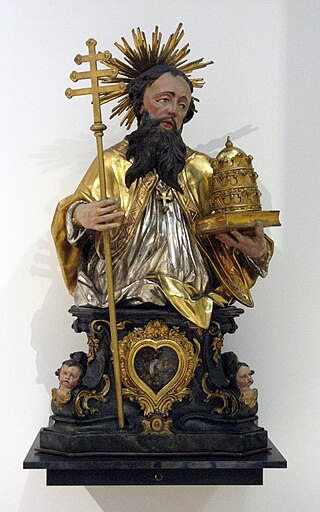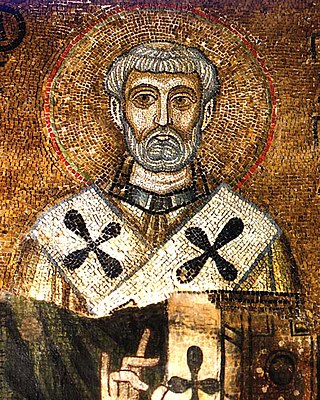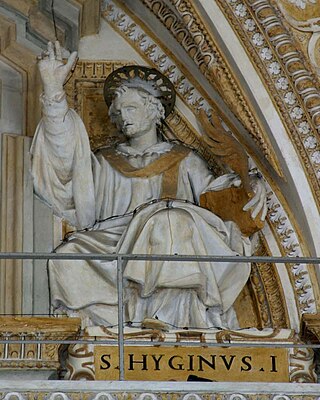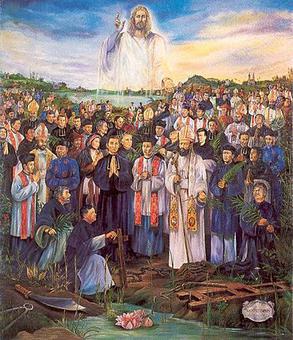
Pope Linus was the bishop of Rome from c. AD 67 to his death. As with all the early popes, he was canonized.

Pope Julius I was the bishop of Rome from 6 February 337 to his death on 12 April 352. He is notable for asserting the authority of the pope over the Arian Eastern bishops, as well as setting December 25 as the official birthdate of Jesus.
Pope Evaristus was the bishop of Rome from c. 99 to his death c. 107. He was also known as Aristus and is venerated as a saint in the Eastern Orthodox Church, the Catholic Church, and Oriental Orthodoxy. It is likely that John the Apostle died during his reign period, marking the end of the Apostolic Age.

Pope Telesphorus was the bishop of Rome from c. 126 to his death c. 137, during the reigns of Roman Emperors Hadrian and Antoninus Pius. He was of Greek ancestry and born in Terranova da Sibari, Calabria, Italy.

Pope Clement I was bishop of Rome in the late first century AD. He is listed by Irenaeus and Tertullian as the bishop of Rome, holding office from 88 AD to his death in 99 AD. He is considered to be the first Apostolic Father of the Church, one of the three chief ones together with Polycarp and Ignatius of Antioch.

Pope Hyginus was the bishop of Rome from c. 138 to his death in c. 142. Tradition holds that during his papacy he determined the various prerogatives of the clergy and defined the grades of the ecclesiastical hierarchy.

Hippolytus of Rome was one of the most important second-third century Christian theologians, whose provenance, identity and corpus remain elusive to scholars and historians. Suggested communities include Rome, Palestine, Egypt, Anatolia and other regions of the Middle East. The best historians of literature in the ancient church, including Eusebius of Caesarea and Jerome, openly confess they cannot name where Hippolytus the biblical commentator and theologian served in leadership. They had read his works but did not possess evidence of his community. Photios I of Constantinople describes him in his Bibliotheca as a disciple of Irenaeus, who was said to be a disciple of Polycarp, and from the context of this passage it is supposed that he suggested that Hippolytus so styled himself. This assertion is doubtful. One older theory asserts he came into conflict with the popes of his time and seems to have headed a schismatic group as a rival to the bishop of Rome, thus becoming an antipope. In this view, he opposed the Roman Popes who softened the penitential system to accommodate the large number of new pagan converts. However, he was reconciled to the Church before he died as a martyr.

James the Great, also known as James, son of Zebedee, Saint James the Great, Saint James the Greater, Saint James the Elder, or Saint Jacob, was one of the Twelve Apostles of Jesus, the first apostle to be martyred according to the New Testament. Saint James is the patron saint of Spain and, according to tradition, his remains are held in Santiago de Compostela in Galicia.

Saint Lawrence or Laurence was one of the seven deacons of the city of Rome under Pope Sixtus II who were martyred in the persecution of the Christians that the Roman Emperor Valerian ordered in 258.

The Vietnamese Martyrs, also known as the Martyrs of Annam, Martyrs of Tonkin and Cochinchina, Martyrs of Indochina, or Andrew Dung-Lac and Companions, are saints on the General Roman Calendar who were canonized by Pope John Paul II. On June 19, 1988, thousands of Overseas Vietnamese worldwide gathered at the Vatican for the Celebration of the Canonization of 117 Vietnamese Martyrs, an event chaired by Monsignor Tran Van Hoai. Their memorial is on November 24.

Petronilla is an early Christian saint. She was venerated as a virgin martyr by the Catholic Church. She died in Rome at the end of the 1st century, or possibly in the 3rd century.
The doctrines of Petrine primacy and papal primacy are perhaps the most contentiously disputed in the history of Christianity. Theologians regard the doctrine of papal primacy as having gradually developed in the West due to the convergence of a number of factors, e.g., the dignity of Rome as the only apostolic see in the West; the tradition that both Peter and Paul had been martyred there; Rome's long history as a capital of the Roman Empire; and its continuing position as the chief center of commerce and communication.

Early Christianity spread from the Levant, across the Roman Empire, and beyond. Originally, this progression was closely connected to already established Jewish centers in the Holy Land and the Jewish diaspora. The first followers of Christianity were Jews or proselytes, commonly referred to as Jewish Christians and God-fearers.
Saint John or St. John usually refers to John the Baptist, but also, sometimes, to John the Apostle.

The Church Fathers, Early Church Fathers, Christian Fathers, or Fathers of the Church were ancient and influential Christian theologians and writers who established the intellectual and doctrinal foundations of Christianity. The historical period in which they worked became known as the Patristic Era and spans approximately from the late 1st to mid-8th centuries, flourishing in particular during the 4th and 5th centuries, when Christianity was in the process of establishing itself as the state church of the Roman Empire.
This page is based on this
Wikipedia article Text is available under the
CC BY-SA 4.0 license; additional terms may apply.
Images, videos and audio are available under their respective licenses.











